The 80/20 Marketing Approach for Coaches
I’ve found coaches get the best results when they focus on marketing strategies that match their natural strengths.
That’s the fastest way to grow your coaching business.
The table below will save you countless hours and thousands of dollars on ineffective marketing.
If You’re Naturally Good At… | Your 80/20 Marketing Focus Should Be… |
|---|---|
Talking & Building Relationships | Networking, Strategic Partnerships, Strategic Referral Systems, Client Success Stories, Free Discovery Sessions |
Writing & Deep Thinking | Content Creation, Email Marketing, Simple SEO, Client Success Stories |
Teaching & Explaining Concepts | Group Programs, Podcast Marketing, Content Creation |
One-on-One Conversations | Free Discovery Sessions, Client Success Stories, Networking |
Public Speaking | Podcast Marketing, Group Programs |
Visual Communication | Social Media, Content Creation |
Organization & Systems | Email Marketing, Simple SEO, Strategic Referral Systems, Simple Paid Advertising |
Analytical Thinking | Simple Paid Advertising, Email Marketing, Simple SEO |
Introverted Personality | Content Creation, Email Marketing, Strategic Partnerships, Client Success Stories |
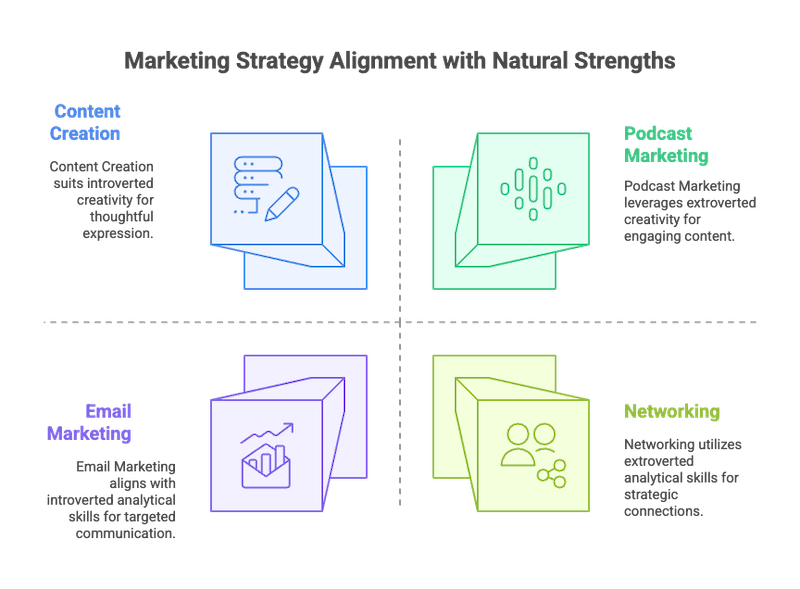
I see too many coaches trying to do everything at once. They end up exhausted and frustrated with minimal results. Instead, choose 2-3 strategies from your strength zones and implement them consistently.
Strategy #1: Define Your Coaching Niche & Positioning
Trying to market to “everyone” actually attracts no one. Your first task is to clearly define who you serve and how.
Start by researching potential coaching niches that match your expertise. Look for areas with unmet needs where your specific skills can make a difference.
Create your unique value proposition using this simple formula:
“I help [specific group] do [specific outcome] so they can [desired result].”
For example: “I help new managers develop confident leadership skills so they can earn respect and advance their careers.”
Test your niche by looking for existing communities, discussion groups, and resources for your target audience.
To refine your niche further, answer these key questions:
- What specific problems can you solve better than most coaches?
- Which clients have you enjoyed working with most in the past?
- What results have your best clients achieved?
- Which industries or demographics do you understand deeply?
Your positioning should highlight both the practical outcomes and emotional benefits of your coaching.
E.g. An executive coach might help clients “lead confidently during organizational change” (practical) while also helping them “reduce stress and regain work-life balance” (emotional).
Document your niche and positioning statements where you’ll see them daily. Use this language consistently across all your marketing materials.
Strategy #2: Build a Conversion-Focused Coach Website
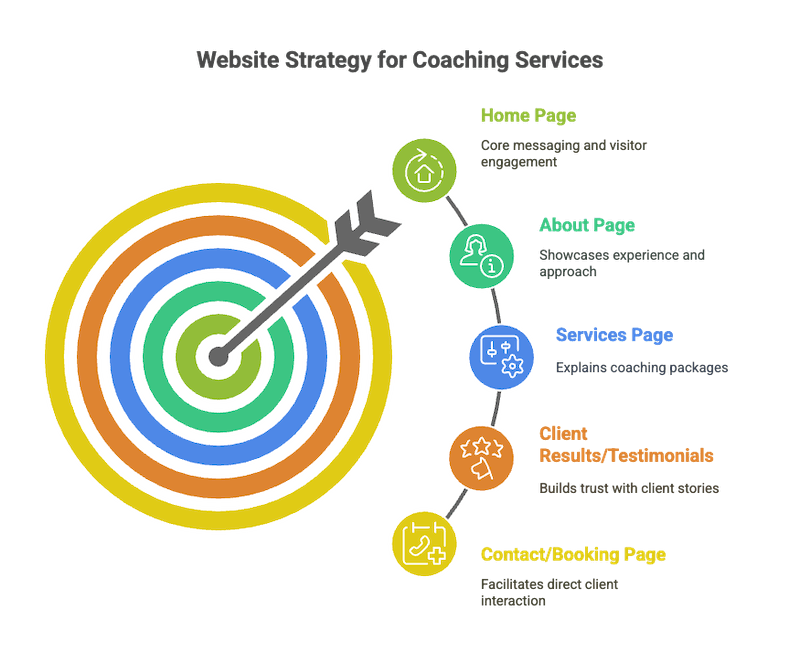
A professional website gives potential clients confidence in your services.
Your website needs just 5 essential pages:
- Home page with clear messaging about who you help
- About page showcasing your experience and approach
- Services page explaining your coaching packages
- Client results/testimonials page
- Contact/booking page
Keep your design clean and professional. Use simple navigation and make sure your site loads quickly on mobile devices.
Include trust-building elements like your credentials, professional photos, and client testimonials. Add a simple call-to-action on every page, such as “Book a Free Strategy Session.”
Your home page should answer these questions within seconds:
- Who do you help?
- What problem do you solve?
- How do you solve it?
- What makes your approach different?
- What should visitors do next?
Use client-centered language throughout your site. Focus on their challenges and desired outcomes rather than just your credentials and process.
Make your contact process frictionless. Ideally, potential clients should be able to book a call directly from your website without needing to email back and forth about scheduling.
For coaches on a budget, platforms like WordPress, Squarespace, or Wix offer professional templates specifically designed for service providers. You don’t need custom development to create an effective coaching website.
Strategy #3: Create Strategic Content That Attracts Clients
Content marketing works exceptionally well for coaches because it demonstrates your expertise before prospects ever speak with you.
Choose content formats that showcase your coaching style. Video yields the highest engagement (87% effectiveness) for coaches with established audiences, while written content works well for those starting out.
Use the “Problem-Agitate-Solve” framework for creating compelling content:
- Identify a specific problem your ideal clients face
- Highlight the consequences of this problem
- Present your coaching approach as the solution
Create content systems that maximize your time. For example, one 30-minute video can become a blog post, several social media posts, an email newsletter, and short clips for Instagram or TikTok.
Coaches who publish consistent content can get more inquiries than those who post sporadically. Quality matters more than quantity, so focus on solving real problems for your audience.
Develop a content calendar based on your clients’ most common questions. Track which topics generate the most engagement and leads, then create more content on those themes.
Repurpose successful content into different formats to reach wider audiences. A popular blog post might become a video, infographic, or even the basis for a free workshop.
Keep a swipe file of content ideas for when inspiration runs low. Include client questions, industry news, and personal insights related to your coaching niche.
Strategy #4: Social Media Strategy for Coaches
Social media platforms differ in which audiences they reach. I recommend choosing just 1-2 platforms where your ideal clients spend time.
Platform | Best For Coaching Niches | Ideal Posting Frequency | Content Ratio (70:20:10) | Key Engagement Tactics |
|---|---|---|---|---|
Executive, Career, Business | 3-5x weekly | 70% thought leadership | Comment on industry posts | |
Life, Wellness, Fitness | 4-7x weekly | 70% visual inspiration | Use coaching hashtags | |
Relationship, Parenting, Group | 3-4x weekly | 70% helpful content | Run engaging groups | |
YouTube | All niches (esp. teaching-focused) | 1-2x weekly | 70% educational content | Create how-to series |
Twitter/X | Business, Executive, Career, Mindset | 5-7x weekly | 70% insights and tips | Use relevant hashtags |
TikTok | Youth, Mindset, Trendy niches | 5-7x weekly | 70% quick tips | Use coaching hashtags |
Start with the platform where your audience hangs out. For example, LinkedIn is particularly valuable for connecting with professionals and B2B buyers, especially executive and career coaches. (Source)
Don’t chase every trend or platform. Pick one that feels comfortable and matches your target audience, then post consistently using the content ratio guide above.
Use content themes to maintain consistency while keeping your feed varied.
E.g. A leadership coach might rotate between tips, client stories, leadership research, and personal insights throughout the week.
Engage authentically with others in your field. Commenting thoughtfully on others’ content often drives more visibility than creating new posts.
Consider using scheduling tools like Buffer or Hootsuite to maintain a consistent posting schedule without daily platform visits.
Batch create content monthly rather than scrambling daily.
Strategy #5: Email Marketing
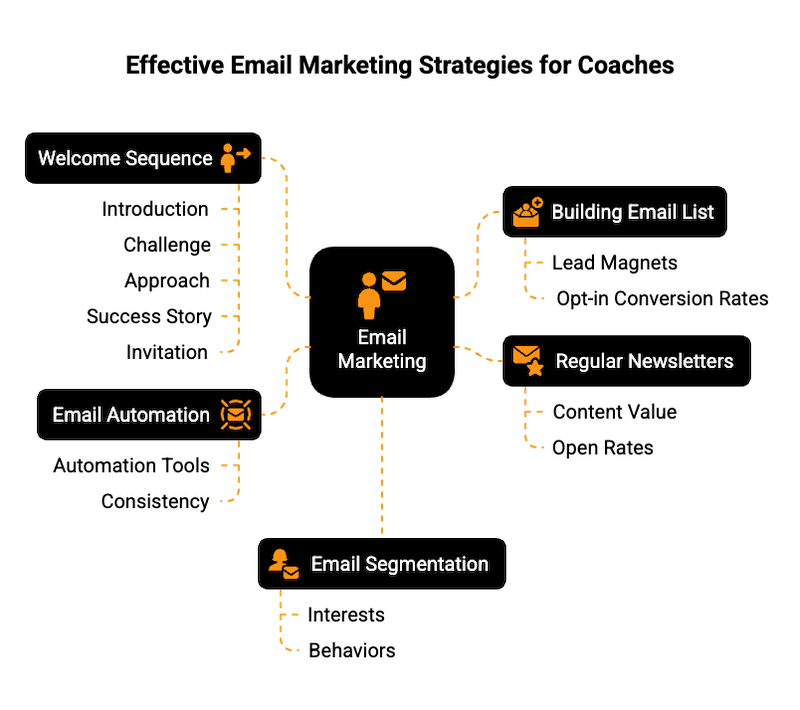
Email remains one of the most effective marketing channels for coaches.
It gives you direct access to potential clients without algorithm changes affecting your reach.
Build your email list with targeted lead magnets that solve specific problems. Well-designed opt-ins achieve 15-25% conversion rates, with highly targeted offers reaching up to 35% according to MailChimp’s benchmark data.
Create a simple 5-email welcome sequence that introduces:
- Who you are and what you do
- A common challenge your clients face
- Your approach to solving this challenge
- A client success story
- An invitation to take the next step
Send regular newsletters (weekly or bi-weekly) with valuable content that helps subscribers solve problems. Well-segmented coaching email lists can see 30-45% open rates.
Use simple email automation tools like BirdSend to send emails consistently without requiring your constant attention.
Segment your email list based on interests or behaviors to deliver more relevant content. For example, separate subscribers who opened emails about group programs from those who clicked on one-on-one coaching information.
Keep email designs simple and mobile-friendly. Most coaching clients read emails on phones, so avoid complex layouts or tiny text.
Test different subject lines to improve open rates. Questions, numbers, and personalization typically perform well for coaches.
Include a clear call-to-action in every email. Tell subscribers exactly what you want them to do next, whether it’s booking a call, reading an article, or responding to a question.
Strategy #6: Free Discovery Sessions
Discovery sessions (also called strategy or consultation calls) remain one of the most effective ways to convert prospects into coaching clients.
Structure your discovery calls in three clear parts:
- Learn about their situation and goals (15 minutes)
- Share your insights and approach (10 minutes)
- Discuss next steps if you’re a good fit (5 minutes)
Use pre-qualification questions on your booking form to ensure you’re talking to potential good-fit clients. This helps increase your conversion rates.
With proper qualification, you can achieve 20-30% conversion rates from cold leads and 30-40% from warm leads. Don’t be discouraged by “no” responses – they help you focus your time on clients who will benefit most from your services.
Create a simple follow-up system for prospects who aren’t ready yet.
A three-email sequence over two weeks can increase your eventual conversion rate by 20%.
Prepare a standard discovery call structure but be flexible enough to adapt to each prospect’s needs. Listen more than you talk during these sessions.
Address common objections proactively during your call. Price concerns, time commitment, and uncertainty about results are typical hesitations prospects have.
Record yourself conducting practice discovery calls to refine your approach. Pay attention to your pace, listening skills, and how clearly you explain your coaching process.
Schedule buffer time between discovery calls to take notes and prepare for the next conversation. Back-to-back sessions often lead to decreased conversion rates.
Strategy #7: Client Success Stories & Testimonials
Nothing builds trust like hearing from satisfied clients.
Collecting and sharing success stories should be a core part of your marketing.
Create a simple process for gathering testimonials after successful coaching engagements.
Ask specific questions like:
- “What was your biggest challenge before we worked together?”
- “What specific results have you seen?”
Always get written permission before sharing client stories. Offer anonymity options for clients in sensitive situations.
Use before-and-after frameworks that highlight transformation.
E.g. “Before coaching, Sarah struggled with confidence in executive meetings. After our work together, she successfully pitched a major project and received a promotion.”
Place success stories strategically throughout your website, especially near calls-to-action where potential clients make decisions.
Collect different types of testimonials for various uses:
- Brief quotes for social media and website headers
- Medium-length stories for service pages
- In-depth case studies for nurturing emails and conversion pages
Update testimonials regularly to ensure they reflect your current coaching approach and typical results. Outdated success stories can sometimes misrepresent your current offerings.
Consider video testimonials for higher impact.
Even simple smartphone recordings of clients sharing their experiences can increase credibility.
Create a system to request testimonials at natural milestones in your coaching relationship. The end of a coaching package, after achieving a specific goal, or at quarterly reviews are good moments to ask.
Strategy #8: Networking
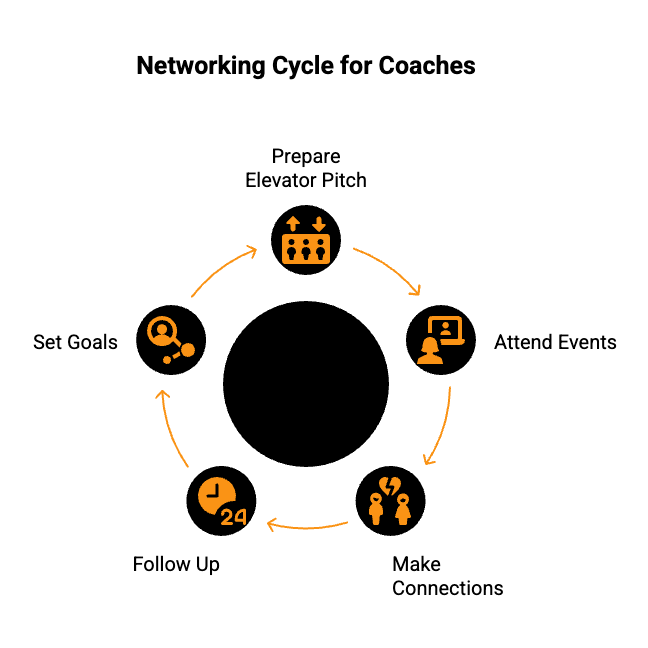
Effective networking remains a powerful way to grow your coaching practice. In-person events still get higher conversion rates than online networking.
Prepare a clear, concise elevator pitch using this template:
“I help [target audience] overcome [specific challenge] so they can [desired outcome].”
Practice until it feels natural.
When attending events, focus on making genuine connections rather than immediate sales. Ask thoughtful questions about others’ work before talking about your own.
Follow up within 48 hours after meeting new contacts. A simple email referencing your conversation and suggesting a next step works well.
Virtual networking through online communities can supplement in-person connections. Look for groups where your ideal clients gather to discuss their challenges.
Set clear networking goals before attending events. For example, aim to have 3 meaningful conversations rather than collecting as many business cards as possible.
Research speakers and attendees before industry events. Identifying a few key people you’d like to connect with helps focus your networking efforts.
Create a simple system for organizing and following up with new contacts. A basic CRM or even a spreadsheet can help track relationships and follow-up tasks.
Join or create mastermind groups with other coaches who serve similar but non-competing audiences.
These relationships often lead to referrals and collaborative opportunities.
Strategy #9: Strategic Referral Systems
Nielsen’s research shows that 92% of people trust referrals from someone they know.
The optimal time to request referrals is after the third month of working with a client. At this point, they’ve experienced enough results to confidently recommend you.
Create a simple referral system:
- Ask satisfied clients if they know others who might benefit from your coaching
- Provide clear information they can easily share
- Thank referring clients (a personal note works better than discounts for professional services)
Track where your referrals come from so you can acknowledge and thank those who regularly send new clients your way.
Partner referral networks with complementary professionals (like therapists, consultants, or HR professionals) can create mutual benefits. Create simple agreements about how you’ll refer clients to each other.
Make it easy for clients to refer you by providing specific language they can use. A simple email template or introduction script removes barriers to referrals.
Consider creating a referral guide that explains your ideal client profile and coaching approach. This helps referral partners send qualified prospects your way.
Check in periodically with past clients who’ve referred others.
These relationships often yield multiple referrals over time when nurtured properly.
Strategy #10: Simple SEO
Search Engine Optimization helps potential clients find you when they’re looking for solutions. You don’t need to be an expert to implement basic SEO.
Focus on long-tail keywords (3-5 word phrases) that potential clients might search for. Examples include “career coach for physicians” or “relationship coach for newly married couples.”
Include these keywords naturally in your website content, especially in:
- Page titles
- Headings
- The first paragraph of content
- Image alt text
For local coaches, create and optimize a Google Business Profile with your location, services, and contact information. This helps you appear in local searches.
Measure basic SEO metrics like website traffic and inquiry sources. Ask new clients how they found you to track which keywords are working.
Create content that answers specific questions your ideal clients ask. “How to” and question-based content often ranks well in search results.
Update your website regularly with fresh content. Search engines favor sites that publish new, valuable information consistently.
Build quality links to your website by guest posting on industry blogs, participating in podcast interviews, or creating shareable resources. These backlinks improve your site’s authority.
Use free tools like Google Search Console and Google Analytics to monitor your website’s search performance. Even basic data can guide your content strategy.
Strategy #11: Podcast Marketing for Coaches
Appearing as a guest on podcasts is one of the most effective visibility strategies for coaches.
Identify podcasts your ideal clients already listen to. Look at audience size, engagement, and topic alignment before pitching.
Create a simple one-page media kit highlighting your expertise and potential topics you can discuss.
Keep pitch emails brief, personalized, and focused on the value you’ll provide to their audience.
Prepare thoroughly for each interview by listening to previous episodes and preparing stories and examples relevant to the audience. Mention a clear call-to-action during your interview – typically a free resource listeners can access.
Track which podcast appearances generate the most website visits and inquiries. Focus future pitching efforts on similar shows.
Create a dedicated landing page for podcast listeners that addresses the specific topics discussed in your interview. This converts more visitors than sending them to your homepage.
Consider starting your own podcast if you enjoy the format and have knowledge to share regularly. Even a simple interview series with peers can build your authority in your coaching niche.
Follow up with podcast hosts after your episode airs. These relationships often lead to recommendations for other podcast appearances.
Strategy #12: Strategic Partnerships
Partnerships with complementary professionals can quickly expand your reach to new potential clients.
Review the tables below to spot potential partners whose clients might need your coaching services.
Personal Development Coaches
Coach Type | Ideal Strategic Partners | Collaboration Opportunities | Mutual Benefits |
|---|---|---|---|
Life Coach | – Therapists / Counselors – Career Transition Specialists – Financial Wellness Advisors | – Holistic life planning workshops – Major life transition programs – Work-life integration courses | – Therapists address past issues; you focus on future goals – Specialists handle technical aspects; you provide overall integration – Clients receive comprehensive life support |
Confidence Coach | – Image Consultants – Body Language Specialists – Social Skills Trainers | – Personal presence masterclasses – Authentic communication workshops – Social confidence intensives | – Image consultants handle external appearance; you work on internal beliefs – Body language experts teach mechanics; you develop genuine confidence – Complete confidence transformation |
Mindfulness/Meditation Coach | – Stress Management Physicians – Corporate Wellness Directors – Productivity Consultants | – Executive calm programs – Decision-making enhancement workshops – Focus and flow training | – Medical professionals handle physiological aspects; you address mental techniques – Corporate programs gain measurable outcomes – High-performance without burnout approach |
Professional Development Coaches
Coach Type | Ideal Strategic Partners | Collaboration Opportunities | Mutual Benefits |
|---|---|---|---|
Career Coach | – Industry-Specific Recruiters – Personal Brand Strategists – Interview Training Specialists | – Career pivot accelerator programs – Professional identity workshops – Industry-specific job search intensives | – Recruiters provide market access; you ensure client readiness – Brand specialists create assets; you ensure authentic positioning – Complete career transition support |
Executive Coach | – Board Advisors – C-Suite Peer Networks – Strategic Planning Consultants | – Executive presence programs – Strategic leadership intensives – Board preparation academies | – Advisors handle governance issues; you develop leadership capacity |
Leadership Coach | – Team Assessment Specialists – Organizational Development Consultants – Conflict Resolution Experts | – Mid-management accelerator programs – People leadership certifications – Team performance optimization | – Assessment tools provide data; you develop application skills |
Sales Coach | – Digital Marketing Agencies – Sales Enablement Software Providers – Customer Research Firms | – Revenue acceleration programs – Customer acquisition systems – Sales process optimization | – Marketing creates leads; you help convert them – Software provides tools; you develop skills to use them – Complete revenue growth ecosystem |
Public Speaking Coach | – Professional Speaker Bureaus – TED/TEDx Organizers – Video Production Companies | – Thought leadership programs – Speaker showcase events – Content delivery masterclasses | – Bureaus provide opportunities; you ensure speakers are ready – Event organizers need qualified speakers; you provide them – Complete presentation development and delivery support |
Technology & Business Coaches
Coach Type | Ideal Strategic Partners | Collaboration Opportunities | Mutual Benefits |
|---|---|---|---|
IT/Technology Coach | – Digital Transformation Consultants – Tech Adoption Specialists – AI Implementation Firms | – Human-AI collaboration workshops – Digital leadership academies – Tech integration programs | – Tech firms provide tools; you ensure adoption and usage – Consultants design systems; you develop the humans using them – Complete technology integration success |
Business Coach | – Fractional CFOs/COOs – Industry-Specific Consultants – Scaling Advisors | – Business growth accelerators – Operational excellence programs – Founder-to-CEO transitions | – Specialists handle specific functions; you ensure overall alignment – Consultants provide industry expertise; you develop leadership – Sustainable business growth across all dimensions |
Financial Coach | – Investment Advisors – Tax Strategists – Estate Planners | – Wealth mindset programs – Financial decision frameworks – Money psychology workshops | – Advisors handle technical aspects; you develop behaviors – Planners create structures; you ensure client follow-through – Complete financial wellness approach |
Relationship & Family Coaches
Coach Type | Ideal Strategic Partners | Collaboration Opportunities | Mutual Benefits |
|---|---|---|---|
Relationship Coach | – Couples Therapists – Dating Platform Specialists – Intimacy Experts | – Communication breakthrough programs – Relationship reset retreats – Dating strategy intensives | – Therapists address deep issues; you provide practical tools – Dating platforms provide connections; you ensure readiness – Complete relationship success strategy |
Parenting Coach | – Child Development Specialists – Family Systems Therapists – Education Consultants | – Age-specific parenting workshops – Family communication programs – Parent-child connection retreats | – Specialists address child-specific needs; you support parents – Therapists handle family dynamics; you provide daily tools – Comprehensive family well-being approach |
Educational Coach | – Subject Matter Tutors – Learning Disability Specialists – College Admissions Counselors | – Student success systems – Learning optimization programs – Academic confidence building | – Tutors provide knowledge; you develop study skills – Specialists address specific challenges; you build overall habits – Complete educational achievement support |
Health & Wellness Coaches
Coach Type | Ideal Strategic Partners | Collaboration Opportunities | Mutual Benefits |
|---|---|---|---|
Health & Wellness Coach | – Preventive Medicine Physicians – Corporate Wellness Directors – Health Tech Innovators | – Holistic health transformation programs – Biomarker improvement systems – Workplace wellness initiatives | – Doctors provide medical oversight; you develop daily habits – Technologies track metrics; you create behavior change – Measurable health outcome improvements |
Nutrition/Diet Coach | – Functional Medicine Practitioners – Fitness Program Developers – Food Service Consultants | – Food relationship programs – Sustainable eating systems – Nutrition optimization workshops | – Practitioners address underlying issues; you create meal plans – Fitness experts handle movement; you manage fuel – Complete physical performance optimization |
Specialized Life Stage Coaches
Coach Type | Ideal Strategic Partners | Collaboration Opportunities | Mutual Benefits |
|---|---|---|---|
Retirement Coach | – Senior Living Consultants – Purpose-Driven Organizations – Legacy Planning Advisors | – “Next chapter” design workshops – Post-career purpose programs – Life transition navigation systems | – Financial advisors handle money; you develop purpose – Living consultants address logistics; you focus on meaning – Complete retirement transition support |
Transition Coach | – Relocation Specialists – New Identity Experts – Cultural Adaptation Consultants | – Major life change programs – Geographic transition support – Identity evolution workshops | – Specialists handle practical aspects; you support emotional journey – Technical experts manage logistics; you develop adaptability – Smoother transitions with both practical and emotional support |
When establishing strategic partnerships:
- Research potential partners whose client base complements (not competes with) yours
- Offer value first through sharing resources or making introductions
- Create formal agreements about referral processes, revenue sharing, and client communication
- Develop co-branded resources that showcase both areas of expertise
- Review partnership results quarterly using defined metrics
- Start with simple referral arrangements before developing more complex collaborations
The most effective partnerships create comprehensive solutions for clients while allowing each professional to focus on their core expertise and unique value.
Strategy #13: Group Programs & Workshops
Group coaching offers allow you to help more people while leveraging your time. They can also serve as an entry point for clients who may later invest in one-on-one coaching.
Convert your individual coaching process into a group format by identifying the core elements that work well in a shared setting.
Focus on common challenges your typical clients face.
Price group programs at 30-40% of your one-on-one rates to make them accessible while maintaining value. For example, if you charge $1,000 monthly for individual coaching, consider $300-400 per person for group programs.
Expect to fill 30-50% of available spots in your first few group offerings.
This improves as you refine your marketing and build a reputation.
Use application processes or pre-qualification questions to ensure group participants are a good fit. This increases completion rates and improves overall results.
Structure group programs with a mix of teaching, discussion, and application. Include clear action steps between sessions to keep participants engaged.
Consider creating a signature group program that runs 2-4 times annually. This allows you to refine your material and build anticipation between cohorts.
Gather testimonials specifically about your group offerings. Prospective participants want to know how the group format benefits them compared to one-on-one coaching.
Offer limited spots for individual coaching within or after your group program. Many participants will want more personalized support after experiencing your approach in a group setting.
–
Strategy #14: Simple Paid Advertising
Paid advertising can accelerate your coaching practice growth, but start small and measure results carefully.
Begin with modest daily budgets ($5-10) to test different approaches without financial risk. Increase investment only when you see positive returns.
Facebook and Instagram ads work well for coaches targeting specific demographics or interests. LinkedIn ads, though more expensive, can be effective for B2B or executive coaching.
Create ad content that offers clear value rather than immediate sales pitches.
Free resources, assessments, or mini-trainings typically outperform direct “hire me” ads.
Track cost per lead and cost per client acquisition carefully. Successful coaching ads typically achieve $20-40 cost per lead and $200-500 cost per client acquisition, depending on your niche and pricing.
Test different ad creative and copy with small budgets before scaling successful campaigns. Small changes in headlines or images can dramatically impact performance.
Use retargeting ads to re-engage website visitors who didn’t take action initially. These typically convert at 2-3 times the rate of cold audience ads.
Create dedicated landing pages for each ad campaign rather than sending traffic to your homepage. This improves conversion rates by maintaining message consistency.
Set clear goals for each campaign based on your current business needs: lead generation, discovery call bookings, or program enrollments.
60-Day Marketing Implementation Plan
Implementing all these strategies at once would be overwhelming.
Instead, follow this systematic 60-day plan to build your marketing foundation step by step.
Week | Focus Area | Key Activities | Expected Outcomes |
|---|---|---|---|
Week 1 | Niche & Positioning | – Research potential coaching niches – Identify target audience pain points – Draft unique value proposition | – Clear target audience defined – Initial positioning statement – Understanding of market needs |
Week 2 | Messaging Framework | – Finalize core messaging – Develop service descriptions – Create elevator pitch – Outline client journey | – Consistent messaging framework – Clear service offerings – Ability to explain your coaching clearly |
Week 3 | Basic Online Presence | – Secure domain name – Set up simple website structure – Create essential pages (Home, About, Services) – Establish basic contact form | – Professional online home base – Digital business card for prospects – Way for clients to reach you |
Week 4 | Content Foundation | – Create one cornerstone content piece – Create simple lead magnet – Set up content organization system – Plan content themes by quarter | – First valuable content asset – Lead generation tool ready – Sustainable content approach |
Week 5 | Email & Nurture | – Set up email marketing system – Create welcome email sequence – Develop opt-in form for website | – Automated relationship-building – Follow-up system for new contacts – Method to nurture prospects |
Week 6 | Client Attraction | – Set up discovery call booking system – Create consultation script – Develop follow-up templates – Practice discovery call flow | – Streamlined booking process – Comfortable consultation structure – Professional follow-up system |
Week 7 | Outreach & Visibility | – Join 2-3 relevant communities – Connect with 5-10 potential partners – Set up one social platform profile – Create basic posting schedule | – Initial network established – First strategic connections made – Focused social presence begun |
Week 8 | Measurement & Planning | – Track initial metrics – Review what’s working so far – Document lessons learned – Create next 90-day action plan | – Understanding of effective tactics – Data-informed next steps – Sustainable marketing rhythm |
Set realistic expectations during this implementation period. First potential clients typically enter your pipeline around weeks 6-8, with conversions often happening by week 10-12.
Don’t get discouraged if results take time. Marketing is about building relationships and trust, which doesn’t happen overnight.
Sustainable Marketing Maintenance Phase
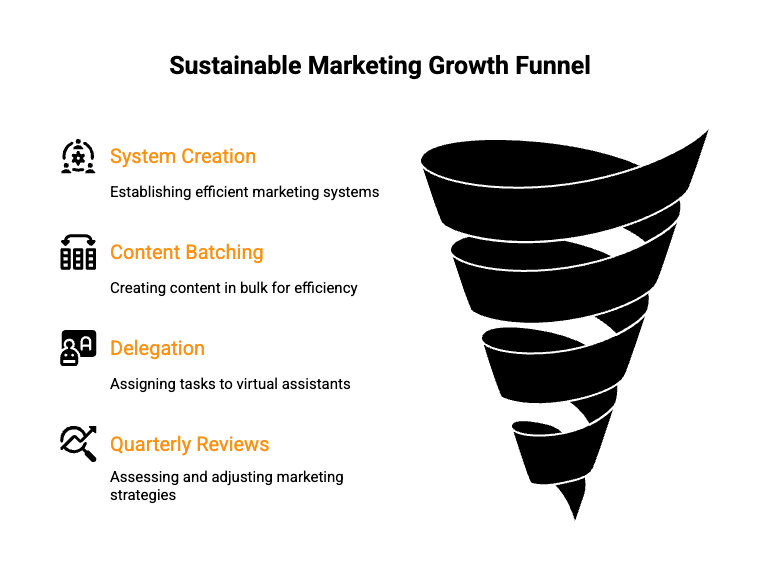
After your initial 60-day implementation, shift to a maintenance approach that prevents burnout and creates sustainable growth.
Create systems that minimize daily marketing demands. Use scheduling tools for social media, template libraries for emails, and automation for routine tasks.
Implement content batching by setting aside 3-5 hours weekly to create multiple pieces at once.
Consider delegation options once your practice generates consistent income. Virtual assistants can manage scheduling, email responses, and basic content posting for 5-10 hours weekly.
Conduct quarterly marketing reviews to assess what’s working and what needs adjustment.
Look at key metrics like:
- Website traffic sources
- Email list growth and engagement
- Discovery call bookings and conversion rates
- New client sources
Adjust your marketing mix based on these insights rather than chasing every new trend or platform.
Beyond the Basics of a Coaching Business
Many coaches focus exclusively on their coaching skills without developing their business acumen.
Building a successful coaching business requires both great coaching expertise and smart marketing.
I’ve found that coaches who achieve long-term success combine their coaching program quality with consistent marketing efforts. This creates a steady stream of new clients while retaining existing ones.
The International Coach Federation reports that coaches with structured business systems attract more clients more consistently.
Let’s explore additional approaches to grow your practice.
Becoming a Marketing Coach for Your Own Business
Even if you’re not a marketing coach by profession, you need to become one for your own business. The most effective coaches treat their marketing with the same seriousness as their client sessions.
Social media groups have become essential connection points for coaches in 2025. Beyond just posting, these groups foster community around your expertise.
Creating a Facebook group specifically for your niche helps you build your own audience. By hosting weekly discussions, you attract people who’ve already shown interest in your coaching field.
Video Marketing: The Coach’s Visibility Accelerator
Video marketing has changed how coaches connect with potential clients.
Short, authentic video content performs better than almost any other format.
Creating engaging content through video helps you build credibility faster than text alone. Potential clients can experience your coaching expertise before booking a session.
Many successful coaches now start their day by creating quick video tips for their social media marketing. This consistent visibility positions you as the go-to person in your niche.
Community Engagement and Organic Growth
Social media marketing works well, but don’t overlook in-person community events. Local workshops, speaking engagements, and industry gatherings create powerful connections.
Health coach and fitness coach businesses particularly benefit from community-based approaches. By offering free coaching sessions at local events, they demonstrate their value directly.
These organic marketing methods often yield better results than paid ads for coaches. They allow potential clients to experience your approach firsthand.
Leveraging Client Referrals Through Systematic Feedback
The most sustainable marketing methods involve your existing audience. Happy clients naturally want to share their positive experiences with others.
Create a simple system to gather client feedback throughout your coaching relationship. This accomplishes two goals: improving your service and collecting testimonials.
When clients send direct messages praising your work, ask permission to share as testimonials. These authentic marketing messages resonate strongly with potential clients.
Expanding Your Online Coaching Business
Many coaches hit an income ceiling with one-to-one work.
To reach a broader audience, consider developing online courses based on your coaching material.
Joint ventures with coaches in complementary fields can quickly expand your existing audience. For example, a career coach might partner with a confidence coach on a joint program. We talked about this in the Strategic Partnerships section.
An online coaching business allows you to serve clients internationally without travel. With the right systems, you maintain a strong online presence across multiple time zones.
Inbound Marketing for Small Business Owners
Traditional marketing methods push messages out to potential clients. Inbound marketing attracts clients by providing valuable resources addressing specific challenges.
Small business owners often make excellent coaching clients, but they’re busy and skeptical. Providing actionable insights and actionable strategies related to industry trends establishes trust with this audience.
This approach works well for coaches who dislike self-promotion. By sharing your own story and expertise through helpful content, you generate leads more naturally.
Your Turn to Do Marketing (for Coaches)
Start by identifying your unique positioning and building a simple website that clearly communicates how you help clients.
Then choose 2-3 marketing strategies from this guide that align with your strengths and preferences. See the 80/20 table.
Marketing is about building relationships and trust. Approach each interaction with genuine interest in helping others rather than simply making sales.
What marketing strategy from this guide will you implement first?
Related
- Ejunkie vs Samcart: the case with the recurring revenue (2026)
- Ejunkie vs Payhip: 0 recurring revenue safety (2026)
- Ejunkie vs Gumroad: no subscriptions vs no ownership (2026)
- Gumroad vs SureCart: the “catch” (2026)
- Payhip vs SureCart: the hidden catch nobody talks about (2026)
- Sellfy vs SureCart: your recurring payments at risk (2026)
- SendOwl vs SureCart: recurring revenue you don’t own (2026)
- SamCart vs SureCart: the recurring payment problem (2026)
- ThriveCart vs SureCart: who really owns your customers? (2026)
- Sellfy vs Easy Digital Downloads: the revenue hostage (2026)
